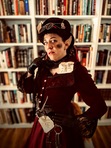Book Review: Pygmalion by George Bernard Shaw
***Spoilers***
I don’t often write reviews with spoilers, but I can’t really explain why I like this book so much without talking about the ending. As with many of my reviews of classics, I find that I must review this book in comparison with the movie that I had seen first. The musical “My Fair Lady” is based off of this play to the point that many scenes are even word for word. The differences between the musical and this book, though, is huge in my opinion.
The story for both “Pygmalion” and “My Fair Lady” is about both Professor Henry Higgins and Eliza Doolittle. Professor Higgins is a linguist who forms a bet with Pickering to covert Eliza from a poor flower girl to a duchess just by cleaning her speech.
The musical really focuses on the character development of Professor Higgins. Eliza tries to exert her independence, but she ends up coming back to Higgins like an abused wife comes back to a pouty abusive husband. The costumes and music are so beautiful that we try to believe that Higgins is actually in love with Eliza even though there is absolutely no proof of it. I thought the actors were great in this movie, but I found the story disturbing. The lesson was very male-centric and Eliza’s independence meant nothing in the end. She came back to fetch his slippers. Nothing changed for her.
From the moment “Pygmalion” was written reader tried to create this sort of love sort between Eliza and Higgins. This caused Mr. Shaw to write a long epilogue explain why a romantic ending such as this was impossible. I completely agree with Mr. Shaw in this.
“My Fair Lady,” portrays inconsistent characters and demeans women. “Pygmalion” is much more consistent and, for a book written by a man, one of the best depictions of women I have ever read.
In “Pygmalion,” Eliza is actually the focus. Higgins thinks of himself as the perfect Victorian gentleman who is creating a piece of art like in the Greek story of Pygmalion. What we learn in the end, though, is that Eliza was always a person of value even before Higgins came around. Eliza learned to be a lady from Pickering because he treated her like a lady from the beginning. Higgins treated Eliza horribly from the beginning and never stopped. It wasn’t Eliza’s speech that made her a lady, because we find out she had a fantastic ear for both speech and music, instead, it was actually how she was treated that matters. Higgins never learns this. His horrible manners and rudeness separate him from good society, while Eliza shines wherever she goes. With all the characters of this story, from Freddy to Eliza’s father, we learn that there is very little difference between high society and they gutter other than money.
Eliza in the end of “Pygmalion” chooses to marry Freddy who loves her. This is as it should be. When being loved and appreciated is so important to Eliza, why would she choose to go back to the horrible treatment of Higgins? Freddy and she open a flower shop with the help of Pickering. Eliza does stay close to Higgins as she does her own awful father, but she has learned self-respect. Once a person learns to value themselves, they can’t allow another person to take that away.
I know many people who think that this ending is a shame. They like Higgin’s bullying ways. I find these are the same people who read romance novels in which male character rapes the female character under the name of “romantic”. Even though I like James Bond novels, I most certainly do not agree with his horrible treatment of women. I can like Higgins for who he is, but I am very grateful he chooses to stay a bachelor.
Eliza’s character has learned to rise up and make her own choices. This isn’t a Cinderella story as so many people want it to be. Eliza’s soul is still the same. She is a survivor and a fighter. It takes a very strong woman to stand up to a man like Higgins who can twist and turn words to get his way. She is what a woman should be and even gets the support of Higgin’s mother in her battle for independence. Mr. Shaw understood well what a woman wants and values. Eliza doesn’t try to become a man to fight back. She just fights back.
This review may have ruined “My Fair Lady” for you, but I find I can still enjoy the music and costumes just fine. After reading this book, I can even watch the musical with the satisfaction that Eliza doesn’t stay in that abusive situation for long. I honestly can enjoy the movie more now after having read the book. Higgins is not Pygmalion even though he wanted to be. Eliza instead is able to show that she always was alive and had value from the very beginning. This is as it should be.
I recommend this book to young adults and older. I wish, especially, that women would read this and learn to expect more from their relationships. I wish that woman would look at this portrait of a strong female character and see that you don’t have to marry the bully just because you can care about him. Love is more than compassion. I wish that woman would stop writing “romantic” novel based off of abusive relationships. Mr. Shaw is a man who understood women better than many women understand women.
One line from “My Fair Lady” that you will never read in “Pygmalion” is “why can’t a woman be more like a man?” In many ways, Mr. Shaw actually asks Higgins “why can’t you humble yourself enough to learn from Eliza?”



